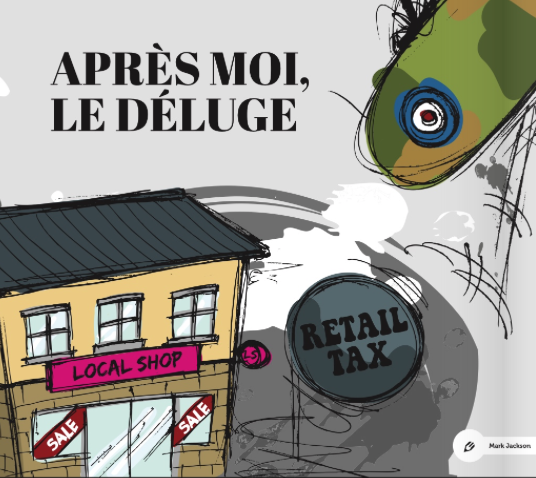

This month, Connect magazine's financial services columnist, The Fool, looks at two new business taxes.
"There is admittedly little more distasteful than a bad winner, but you’d have to be hard of heart, dear reader, not to marvel at the prescience of the Fool’s mystic powers, given the timing of last month’s peer into the crystal ball, and the confluence of tax incidence, political honesty, and impending elections.
"Understanding who is likely to foot the bill for, and likely consequences of, the new Infrastructure Levy (that would be, respectively, house buyers, higher property prices, and the opportunity for more Rachman-styled gouging by landlords. So ‘nice one’ Environment bloke) has turned, like a previous night’s fetid takeaway lingering at the back of the fridge, into something I didn’t envisage returning to quite so rapidly, nor with such relish. (Don’t look at me with your epicurean distain, you’ve been there too, you low life).
"But lo and behold, and to mangle one’s metaphors, what should show up like the proverbial bad bus, but more proposals from incumbent politicians that are likely to offer outcomes which differ from those promised on the tin.
"I present to the jury exhibit A, the proposed Large Retail Operation Income tax, a sliding scale charge, up to a maximum of 20%, on companies earning an annual profit of over £500K, and slated to raise £ 5.7 million each year.
"Now we all know the story. Big tax dodging corporations bad, public services good. So, in theory, getting Waitrose and their ilk to pony up for new granite road surfaces looks like a political winner.
"However, in order to see the whole picture, we need to ask who will suffer to give us this reduction in public sector final salary pension deficits, sorry, enhanced public services?
"Last time I looked, the island’s largest retailers were not charitable organisations. Despite the jaunty advertising jingles and customer loyalty programs, they are in fact in the business of making money, and the biggest of the big are the major food retailers. They are, with one notable exception, large UK companies with shareholders. It’s a competitive business, which operates on large turnover and relatively thin margins. So what options do they have to mitigate an increase in their tax charge?
1) Take it on the chin and accept lower earnings.
2) Increase prices to reflect the increased cost of doing business.
"They could go with option 1 and disappoint their shareholders. But if we are realistic, it’s likely to be option 2, so prices are likely to increase. This means that the tax incidence (the person paying the tax) ends up falling on you and I, not the big evil tax dodging corporation we were told would suffer.

Pictured: "The person paying the tax ends up falling on you and I, not the big evil tax dodging corporation we were told would suffer," says the Fool.
"This wouldn’t be so bad of course, if you could simply substitute some other product for ‘food’ - but you can’t. Even if you manage to survive on a diet of Gin and Haribos, there is a minimum amount you have to spend on calories each week, and this applies whether your earnings are £100 or £100,000.
"Sure, your chicken nuggets might contain increasing amounts of actual chicken if you can afford to spend more, but a rise in food prices not only causes immediate inflation, but hurts those on the lowest incomes the most - (the percentage of income spent on the essentials being the key number).
"So, more inflation, and disproportionately punishing the least well off. Now that’s a brave election promise if ever I saw one.
"The other apparent easy win is the politician’s new favourite, an increase in the minimum wage. A proposal by the Minister for Social Security, based upon the work of a supposedly independent forum, is that the minimum wage should increase to £ 7.50 in 2018, a rise of 4.5%, the largest ever recommended. That recommendation is based primarily upon two factors.
1) Average Earnings are rising (Just ponder for one moment the circular logic that has to be ignored if the Chief Minister’s desire to increase the minimum wage so it becomes 45% of the Mean Average Wage by 2020 actually occurs. Higher wages beget higher wages beget higher wages etc..)
2) The cost of Living is rising (RPI is running at around 2.7%)
"This statement from the consultation document recommending the minimum wage hike is particularly pertinent:
“On the whole, GVA Trends in 2016 look to have been worse than expected…The medium term outlook for the Jersey economy has not changed and the challenges remain the same as those we previously highlighted.”
"GVA is how much value economic value each employee contributes. So it is being proposed that we artificially increase certain wages by nearly 2% over the rate of inflation based not on the value those jobs are creating (which it is acknowledged is growing at a slower rate than expected), but because (a) the average wage is rising, and because (b) inflation is growing.
"I’m sorry. If you honestly believe that handing certain people an above-inflation rate pay rise whilst at the same time professing concern about the damaging effects of inflation, or that a rise in wages for one group of workers is sufficient justification for increasing wages for another without any regard to the value those jobs are creating, not only are you lying to yourself, you’re lying to the public.
"It will be interesting when this proposition is brought to the States, given that precedent dictates that being economical with the truth only attracts censure if the lies are told to other politicians."
You can read more from the Fool in Connect magazine each month.
Comments
Comments on this story express the views of the commentator only, not Bailiwick Publishing. We are unable to guarantee the accuracy of any of those comments.